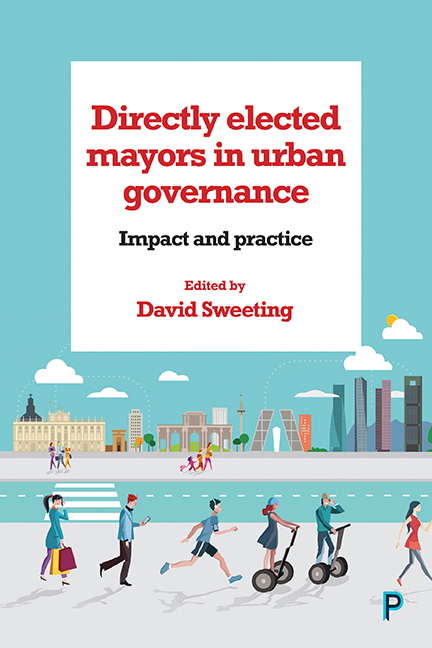thirteen - New and established mayoralties: lessons for local governance in constructing new political institutions – the English and Polish cases
Published online by Cambridge University Press: 05 April 2022
Summary
Introduction
Central–local government relations are a common point of discussion across Europe and have spawned considerable literature often viewed through the lens of ‘territorial politics’ as a means of understanding the distribution of power relations (see Jeffery, 2008; Swianiewicz, 2010; Loughlin et al, 2011). The chapter examines one dimension of these relations by analysing the shift in power towards directly elected mayors that has taken place in England and Poland. In both cases, directly elected mayors have been viewed by central (and local) government as a means of rebalancing and redesigning the political landscape. While reaction to the introduction of elected mayors has ranged from lukewarm to outright hostility among local political elites (particularly in England – Copus, 2006) – as established political elites see a transfer of power from themselves towards the citizen through direct election – such antipathy is not surprising as elected mayors have changed the power balance within local government.
In the case of England, the arrival of directly elected mayors through the Local Government Act of 2000 provided for some local citizens choice over the system of local leadership, as a ‘yes’ vote was required from a referendum before a mayor could be introduced. The 2007 Local Government and Public Involvement in Health Act, however, enabled councils to resolve to adopt an elected mayor without a referendum. Although this meant that councils – rather than citizens – were in the driving seat of change, the legislative change did not lead to a widespread adoption of directly elected mayors. Indeed, by 2015 only two city councils – Liverpool and Leicester – had chosen this route. Such a limited uptake ran counter to the rhetoric of the Conservative government (and the previous Conservative–Liberal Democrat coalition) elected in 2015 with a localism agenda that included greater devolution to urban areas and a preference for elected metro-mayors heading newly formed combined authorities (collaborative working arrangements between several urban local authorities). But, at the time of writing in 2016 there were only 16 elected mayors (excluding the Mayor of London) in England from a total of 352 councils. All of this begs the question as to whether elected mayors are a significant development or a failed experiment in the long history of central–local relations.
- Type
- Chapter
- Information
- Directly Elected Mayors in Urban GovernanceImpact and Practice, pp. 221 - 242Publisher: Bristol University PressPrint publication year: 2017

